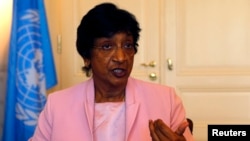Outgoing U.N. Human Rights Commissioner Navi Pillay has scolded the United Nations Security Council for its lack of action on some of the world’s most serious crises, saying hundreds of thousands of lives could have been saved through greater council responsiveness.
Pillay, a former South African jurist will wrap up a six-year tenure as the top U.N. human rights official at the end of this month.
Known for her outspokenness on topics ranging from the conflict in Syria to gay rights, in her final briefing, Pillay spoke of crises around the world, from the Middle East to Africa to the Ukraine.
"None of these crises erupted without warning," she said. "They built up over years, and sometimes decades, of human rights grievances: deficient or corrupt governance and judicial institutions; discrimination and exclusion; inequities in development; exploitation and denial of economic and social rights; and repression of civil society and public freedoms."
Pillay said early detection mechanisms repeatedly warned of these potential crises.
“So although the specifics of each crisis could not necessarily be predicted, many of the human rights violations that were at their core were known. They could have been addressed,” she said.
On the more than three-year war in Syria, Pillay warned the conflict is spreading outward and its eventual limits cannot be predicted.
She said such crises highlight the full cost of the international community's failure to prevent conflict. Pillay said it is first the state’s duty to protect its citizens, but when it fails, the Security Council must act.
"But when governments are unable or unwilling to protect their people, it is the responsibility of the international community and, singularly, this council to intervene, and to deploy the range of good offices, support, inducements and coercion at its disposal to defuse the triggers of conflict," she said.
In an apparent reference to the lack of consensus among council members on issues such as Syria, she said short-term geopolitical concerns and narrowly defined national interests have repeatedly taken priority over ending human suffering.
“I firmly believe that greater responsiveness by this council would have saved hundreds of thousands of lives,” Pillay said.
During Thursday’s meeting, Secretary-General Ban Ki-moon paid tribute to Pillay, saying she has been an “outstanding United Nations leader” who “tells it like she sees it.” Ban said people who face discrimination and rights abuses know Pillay is their advocate and she will continue to be a key voice for human rights.




